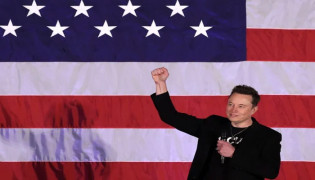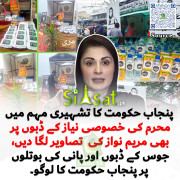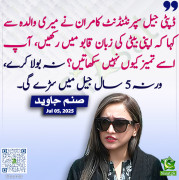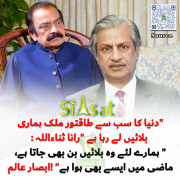C
commander
Guest
I watched the much talked about My Name is Khan the other day. The brilliant depiction of an autistic person by Shah Rukh Khan and Karan Johar’s surprisingly taut direction made for a good film. I had been warned by friends to keep tissues handy, as many friends had their eyeliners washed away as they sniffled through the film.
I have never been emotionally vulnerable and usually don’t cry in public, so although the film was stirring, it did not send me scrambling through my handbag for those back-up tissues. That is, except for one scene. And in that one scene, I felt a lump form in my throat as I reached for that tissue paper. On screen, actress Sonya Jehan – who plays Khan’s sister-in-law, a working woman who wears a hijab while living on the West Coast of the United States – is walking down a hallway when her hijab is pulled off. This is yet another expression of resentment against Muslims in the wake of the 9/11 attacks that the film portrays. After the insult, Jehan’s character decides to no longer cover her head in public.
Thankfully, at a later point, Jehan opts to put her hijab back on, no matter what the consequences, because she feels incomplete without it. “It’s me,” she says. That scene struck a chord and inspired this blog, for it reminded me about my own journey of starting to wear the hijab.
I discovered my spirituality as I reached my teens. My parents were not the coercive type, and they gave us the right to disagree, question, and think for ourselves. Innately curious, I soon found myself reading the Quran in translation, in an effort to better understand its meaning. A few persuasive teachers and friends guided me through this process. As I read, a new world opened up to me.
At this stage in my life, I was an average kid. Like most teenaged girls, I believed my hairstyle was my asset. Looking good was one of the prime goals in my life. One toss of my crowning glory made my heart soar with confidence. Bad hair days, meanwhile, were a nightmare.
As the years passed, I started to seriously consider doing hijab. After what felt like a personal tug-of-war, I clumsily covered my hair for the first time with no idea what I was doing, or whether I would be able to keep it up. For someone whose hairstyle was her signature trademark, this wasn’t an easy step. And on a practical level, it wasn’t easy because the dupatta kept slipping off.
Back then, the hijab was less common than it is now, and people were less accepting. Friends and colleagues said that I was “looking so old,” or looking like a “maasi.” As someone who was used to receiving compliments, I found these asides difficult to handle. I soon gave up.
That move was an ordeal in itself. Everywhere I went, I heard comments such as, “See? This is why I don’t do it. People start to wear hijab, then take it off. They’ve made a joke of it.” Inwardly, I kicked myself because I knew they were right; I was ashamed of my inconsistency. But the truth is that I needed more time.
Different phases followed. I had feel-good-about-it phases, and then there were the shaky phases. At that time, I knew I was not at peace unless I wore the hijab. And so I started wearing it again, and this time it was a more conscious decision. On the one hand, I felt respected, protected, and true to what my heart and mind said was the right thing to do. This was my choice, without force. On the other hand, there were still days when I felt lost without my hair over my shoulders.
As I continued wearing the hijab, some would praise me encouragingly, saying I looked beautiful with my head covered. Others called me all those terms recently added to the dictionary such as Ninja, Fundo, Taliban. A few would tell me to go do “Allah Allah” at home with the oldies, and not spoil the fun of others by coming to weddings and functions. Others gave me apologetic smiles, fumbled with their dupattas, or perched them on their heads as soon as they saw me.
Amongst all these reactions, what I wanted was fairly simple. I just wanted everyone to treat me as they always had, like a normal person. Just let me be. I wasn’t abnormal. I was just a non-conformist who wanted to follow her religion. I was a woman making a choice, which is normally perceived as a sign of emancipation. It was strange to me that my dressing differently was seen by some as a sign of oppression, and worse, extremism.
As the years have passed, life is better. Today, due to globalisation and a more open-minded approach towards life, people, and especially the youth, are more accepting of who people are. My daughter’s teenaged friends are less judgmental than their counterparts in my college days.
Yet even now, I have to fight the stereotypical image of a hijabi every day. I have to smile a little extra to show people that I have not donned the hijab owing to a depressive phase or a mental breakdown. Until I utter a few intelligent sentences, people who meet me for the first time assume I am conservative, and worse, a brain-washed or unintelligent person. I find my male counterparts have to go through the same thing because they have a beard or wear their pants above their ankles.
Through it all, amazingly, I have remained the same person. I want to look and feel good, achieve my goals, and enjoy life, but within the framework I believe has been defined by my faith. And thankfully, I am not angry or bitter. I understand where people are coming from. I only wish they understood where I am coming from!
I have also been fortunate enough to meet those – and there are many – who are genuine liberals: they accept the right of every individual to use their freedom of choice. And if someone uses that freedom of choice, like me, to dress a certain way, these true liberals accept that. They do not see me in the context of what I wear, but gauge me in light of what I do and who I am.
I have never been emotionally vulnerable and usually don’t cry in public, so although the film was stirring, it did not send me scrambling through my handbag for those back-up tissues. That is, except for one scene. And in that one scene, I felt a lump form in my throat as I reached for that tissue paper. On screen, actress Sonya Jehan – who plays Khan’s sister-in-law, a working woman who wears a hijab while living on the West Coast of the United States – is walking down a hallway when her hijab is pulled off. This is yet another expression of resentment against Muslims in the wake of the 9/11 attacks that the film portrays. After the insult, Jehan’s character decides to no longer cover her head in public.
Thankfully, at a later point, Jehan opts to put her hijab back on, no matter what the consequences, because she feels incomplete without it. “It’s me,” she says. That scene struck a chord and inspired this blog, for it reminded me about my own journey of starting to wear the hijab.
I discovered my spirituality as I reached my teens. My parents were not the coercive type, and they gave us the right to disagree, question, and think for ourselves. Innately curious, I soon found myself reading the Quran in translation, in an effort to better understand its meaning. A few persuasive teachers and friends guided me through this process. As I read, a new world opened up to me.
At this stage in my life, I was an average kid. Like most teenaged girls, I believed my hairstyle was my asset. Looking good was one of the prime goals in my life. One toss of my crowning glory made my heart soar with confidence. Bad hair days, meanwhile, were a nightmare.
As the years passed, I started to seriously consider doing hijab. After what felt like a personal tug-of-war, I clumsily covered my hair for the first time with no idea what I was doing, or whether I would be able to keep it up. For someone whose hairstyle was her signature trademark, this wasn’t an easy step. And on a practical level, it wasn’t easy because the dupatta kept slipping off.
Back then, the hijab was less common than it is now, and people were less accepting. Friends and colleagues said that I was “looking so old,” or looking like a “maasi.” As someone who was used to receiving compliments, I found these asides difficult to handle. I soon gave up.
That move was an ordeal in itself. Everywhere I went, I heard comments such as, “See? This is why I don’t do it. People start to wear hijab, then take it off. They’ve made a joke of it.” Inwardly, I kicked myself because I knew they were right; I was ashamed of my inconsistency. But the truth is that I needed more time.
Different phases followed. I had feel-good-about-it phases, and then there were the shaky phases. At that time, I knew I was not at peace unless I wore the hijab. And so I started wearing it again, and this time it was a more conscious decision. On the one hand, I felt respected, protected, and true to what my heart and mind said was the right thing to do. This was my choice, without force. On the other hand, there were still days when I felt lost without my hair over my shoulders.
As I continued wearing the hijab, some would praise me encouragingly, saying I looked beautiful with my head covered. Others called me all those terms recently added to the dictionary such as Ninja, Fundo, Taliban. A few would tell me to go do “Allah Allah” at home with the oldies, and not spoil the fun of others by coming to weddings and functions. Others gave me apologetic smiles, fumbled with their dupattas, or perched them on their heads as soon as they saw me.
Amongst all these reactions, what I wanted was fairly simple. I just wanted everyone to treat me as they always had, like a normal person. Just let me be. I wasn’t abnormal. I was just a non-conformist who wanted to follow her religion. I was a woman making a choice, which is normally perceived as a sign of emancipation. It was strange to me that my dressing differently was seen by some as a sign of oppression, and worse, extremism.
As the years have passed, life is better. Today, due to globalisation and a more open-minded approach towards life, people, and especially the youth, are more accepting of who people are. My daughter’s teenaged friends are less judgmental than their counterparts in my college days.
Yet even now, I have to fight the stereotypical image of a hijabi every day. I have to smile a little extra to show people that I have not donned the hijab owing to a depressive phase or a mental breakdown. Until I utter a few intelligent sentences, people who meet me for the first time assume I am conservative, and worse, a brain-washed or unintelligent person. I find my male counterparts have to go through the same thing because they have a beard or wear their pants above their ankles.
Through it all, amazingly, I have remained the same person. I want to look and feel good, achieve my goals, and enjoy life, but within the framework I believe has been defined by my faith. And thankfully, I am not angry or bitter. I understand where people are coming from. I only wish they understood where I am coming from!
I have also been fortunate enough to meet those – and there are many – who are genuine liberals: they accept the right of every individual to use their freedom of choice. And if someone uses that freedom of choice, like me, to dress a certain way, these true liberals accept that. They do not see me in the context of what I wear, but gauge me in light of what I do and who I am.
Last edited by a moderator:



































